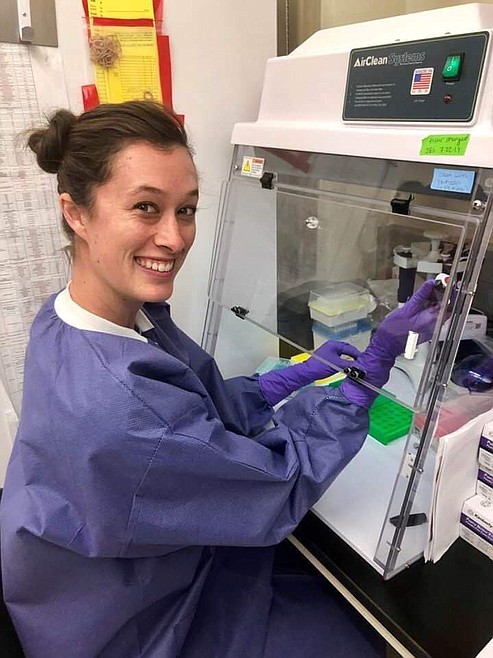Whitefish graduate part of vaccine research
Myndi Holbrook is among the scientists working on the front lines for research regarding COVID-19 and those seeking a vaccine for the virus.
Holbrook, who graduated from Whitefish High School in 2015 and earned a microbiology degree from Montana State University, is a post-baccalaureate fellow at Rocky Mountain Laboratories in Hamilton.
“It’s a very unique experience to be a young scientist right now to see what’s happening firsthand with the research,” Holbrook said. “This is probably the most extreme case — the lab has been working on Ebola for a long time, but that hasn’t hit the U.S. before. The last time something like this happened here was probably the Spanish Flu. Being on the front lines of the research and learning the details before anyone else is pretty remarkable.”
Rocky Mountain Laboratories is a National Institutes of Health state-of-the-art biomedical research facility that includes individual research groups that study specific infectious agents. The Hamilton laboratory is probably best-known for its research into Rocky Mountain spotted fever and Lyme disease.
Holbrook has been working for almost a year in the Virus Ecology Section in the Laboratory of Virology, which focuses on the rise of emerging viral disease. She has another year in her current position and then hopes to continue working in a similar capacity at the lab.
Holbrook works primarily under Neeltje van Doremalen, who is an expert in coronaviruses, which includes COVID-19, which is a new disease previously not seen before in humans. Holbrook previously was involved in designing field tests for research regarding coronaviruses and bats.
More recently Holbrook worked with the team that completed research determining how long the virus that causes COVID-19 survives on surfaces. The study tried to mimic the virus being deposited from an infected person onto everyday surfaces.
Scientists found that the virus was detectable in the air for up to three hours, up to four hours on copper, up to 24 hours on cardboard and up to three days on plastic and stainless steel — suggesting that people may acquire the virus through the air and after touching contaminated objects.
Holbrook said she enjoys her role working at the lab bench, spending hours preparing hundreds of cell-culture plates used by her colleagues who work inside a high-level biosafety laboratory facility.
“I’m lucky enough to be support for the testing that’s happening,” she said. “It feels good that they trust me to handle the samples. I’m really comfortable being a team player and supporting others in the lab.”
Whitefish High teachers such as Colleen Sullivan and Todd Spangler inspired Holbrook’s interest in science. Due to a brain aneurysm she suffered prior to high school, Holbrook said she struggled with school, even through college, primarily because of issues related to her short-term memory.
But when she discovered, during college, the opportunity to work in a laboratory she found her niche in science.
“That’s the best thing that happened to me that I did the training to work in the lab,” she said. “I really enjoyed following the protocols of the lab — that’s what encouraged me to keep going.”
Connections at Montana State University and her involvement with 500 Women Scientists, a nonprofit aimed at making science open, inclusive and accessible, helped her to earn a job at Rocky Mountain Laboratories, which she says in an ideal place to live and work.
“I’m obsessed with Montana,” she said. “It’s the best being a scientist here. The stress of the super intense science can be a lot, but there’s no traffic to drive home in and it’s super simple living.”
The Hamilton lab includes world-renowned scientists working on cutting-edge science, she noted. In addition, the multinational pharmaceutical company GlaxoSmithKline has a facility in Hamilton.
“I would encourage Montana kids that there are a lot of opportunities right here where they can have careers in science,” she said. “There’s a ton of job opportunities right here. Follow something you know you have a passion for.”


